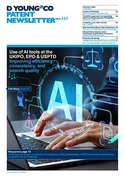Database management and information retrieval systems - has their time finally come?
The realm of computer-implemented inventions is a challenging one, with traps and pitfalls for the unaware and unwary. The guidance provided by the European Patent Office (EPO) to its examiners for assessing the patentability of computer-implemented inventions provides valuable insight into how to navigate this troublesome area.
As we reported earlier in the year, the EPO Guidelines for Examination were updated in March 2021, bringing about a number of changes in how computer-implemented inventions are handled. In particular, these updated Guidelines introduced for the first time a section relating to database management systems and information retrieval (G-II, 3.6.4), which provides some welcome clarification as to how to obtain a patent in this area.
Database management systems - technical systems and technical considerations
In this new section, the EPO has made it clear that it considers database management systems to be technical systems that perform the technical task of storing and retrieving data in an efficient manner. As such, the EPO is likely to find a method performed in a database management system as not being excluded from patentability.
The EPO has further clarified that features of a claim that specify the internal functioning of a database management system are based on technical considerations and thus contribute to the technical character of the claim. Accordingly, these features may support the presence of an inventive step.
That being said, not all features implemented in a database management system are necessarily technical in character by virtue of their implementation in this technical system. For example, a feature of a database management system for accounting costs related to the use of the system by different users would not impart a technical contribution.
Database management systems - query execution and data structures
The EPO has further clarified its position on the execution of structured queries: “optimising the execution of such structured queries with respect to the computer resources needed (such as CPU, main memory or hard disk) contributes to the technical character of the invention” as it involves the efficient exploitation of the computer system.
Additionally, data structures used in database management systems, for example indexes, hash tables, or query trees, may also contribute to the technical character of the invention if the data structure controls operation of the database management system to facilitate access to data or for the execution of structure queries. However, if the data structure is based on cognitive data rather than functional data, then such a data structure would not be considered technical.
Information retrieval
The EPO has provided further guidance in relation to systems for information retrieval. Such systems may comprise searching for information in a document, searching for documents themselves, or searching for metadata that describes data such as texts, images or sounds. If a search is based on finding relevant or similar documents and the method of estimating the relevance or similarity is based solely on non-technical considerations, such as cognitive context, purely linguistic rules or other subjective criteria, then the method does not make a technical contribution.
In addition, the new section states that the translation of linguistic considerations into a mathematical model with the aim of enabling linguistic analysis to be done by a computer involves technical considerations. However, it is stressed that this in itself is not enough to guarantee technical character of the mathematical model – the internal functioning of the computer on which it is to be run must also be a consideration.
As an example, a mathematical model for calculating the probability that a given term is similar in meaning to another term by analysing the co-occurrence frequency of two terms in a collection of documents would not bring about a technical contribution in itself as it is based on purely linguistic considerations. Indeed, in the context of this example, a “better search” would be subjective.
Conclusion
While obtaining protection for computer-implemented inventions remains challenging, it would appear that the EPO has had a step-change in its approach, such that applications for computer-implemented inventions in the field of database management systems and information retrieval have a substantially improved prospect of achieving grant.
If you have any questions on this subject or would like any assistance with protecting a computer-implemented invention, please contact your usual D Young and Co representative.



